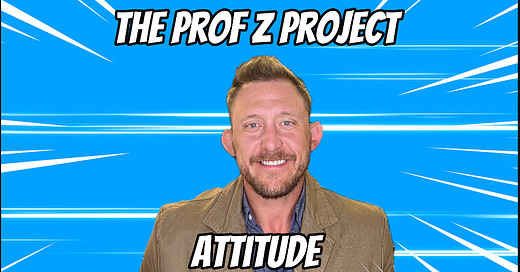One of the most underrated skill sets in business—and life—is attitude.
We treat it like a fixed personality trait. You either have a good attitude or you don’t. But that’s wrong. Attitude is a skill. It’s trainable. Just like communication, problem-solving, storytelling, or strategy.
And it might be more important than all of them.
What Is Attitude?
Attitude isn’t about being happy. It’s not toxic positivity. It’s not some rah-rah optimism.
Attitude is your internal stance toward discomfort, challenge, failure, and opportunity.
It’s how you show up when things suck.
You train it by practicing how you reframe adversity. How you keep showing up when you don’t want to. How you stay coachable, curious, and deliberate in your responses.
It’s not natural for most people. But it’s possible for all of us.
Attitude Matters
Every great leader, athlete, or business operator I’ve worked with has this in common: they trained their attitude.
In the Army, my first big test was Ranger School (aside from a four-year military school). You’re cold, tired, wet, and hungry—for weeks. Then you’re expected to lead people who are also cold, tired, wet, and hungry. It doesn’t teach you to be tough. It teaches you how to keep moving when you don’t feel tough at all.
You’re broken. You want to quit. And you don’t. That’s attitude. You don’t control the mission—but you do control how you show up for others.
Same story in startups. Founders are constantly getting punched in the face. Setbacks, pivots, bad bets. But the best ones bounce back faster. They reframe. They rally. And they convince others to come with them.
At Apple, I’ve worked with some of the top high performers in the world. They’re not just smart. They’re consistent. They’re resilient. They don’t panic. In the short term, results are determined by intensity. In the long term, they’re determined by consistency. The best don’t trade the latter for the former.
What the Science Says
According to Dr. Jack Lesyk from the Ohio Center for Sport Psychology, elite athletes share nine core mental skills. The first?
Choose and maintain a positive attitude.
That’s the foundation for everything else:
Maintain a high level of self-motivation.
Set high, realistic goals.
Deal effectively with people.
Use positive self-talk.
Use positive mental imagery.
Manage anxiety effectively.
Manage their emotions effectively.
Maintain concentration.
Dr. Lesyk points out that a positive attitude is critical for learning, sustaining effort, and developing excellence over time. Top athletes don’t just bounce back from failure—they learn from it. They pursue growth, not perfection.
How to Train It
Like any skill, attitude is built with reps, feedback, and intention. Here’s how:
Do it anyway.
Every time you think to yourself “I’ll do it later” is a rep of laziness. Stretch the muscle. Do the thing. Train yourself to act, not react. Seperate your feelings from the tasks at hand.
Reframe everything.
Tell yourself: This is a test. This is training. Hard things make me better. The way you explain discomfort to yourself determines your performance inside it.
Audit your environment.
Surround yourself with people who elevate your standards. Positivity is infectious—and so is mediocrity. Choose wisely.
Separate emotion from execution.
You can feel sad, angry, tired, or frustrated—and still perform. Feel what you need to feel. But don’t let those feelings dictate how you show up.
We don’t control most outcomes. But we do control how we meet them. That’s attitude.
The Game
Just like elite athletes choose how they show up to their sport, we have to choose how we show up to the games we play—at work, at home, in life.
Gratitude, humility, positive self-talk—these aren’t fluffy ideas. They’re performance tools. They’re
armor.
Most of our lives are spent in conversation with ourselves. If that voice is constantly negative, self-doubting, and critical, how can you expect to show up strong for anyone else?
From Ranger School to startups to the corporate elite, one truth holds: Winning never starts with outcomes—it starts with how we approach the game, especially when it’s hard.
Connect with Zach
Website • Twitter • LinkedIn • Youtube





